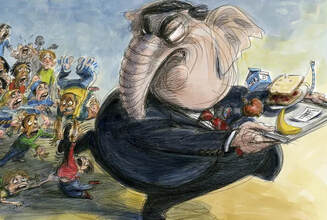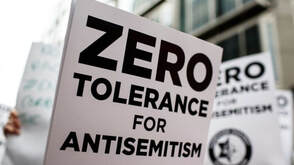Especially when election time rolls around, many churches cannot resist the temptation to become involved in politics despite the prohibition. The large majority of churches are registered for tax exemption under IRC section 501(c)(3). A 1954 law prohibits them from directly or indirectly participating in, or intervening in, any political campaign on behalf of or in opposition to any candidate for elective public office. Over the years, Congress has strengthened the ban.
Urging congregants to vote for or against a candidate is prohibited and should result in the loss of a church’s tax-exempt status. Except that most of the time, it does not.
Certain activities or expenditures are not prohibited depending on the facts and circumstances. For example, certain voter education activities (e.g., publishing voter education guides) conducted in a non-partisan manner do not constitute prohibited political campaign activity. Other activities intended to encourage people to participate in the electoral process, such as voter registration and get-out-the-vote drives, are also not prohibited political campaign activity if conducted in a non-partisan manner. IRS Revenue Ruling 2007-41 says that churches can engage in a limited amount of lobbying (including ballot measures) and advocate for or against issues in the political arena.
However, voter education or registration activities with evidence of bias that (a) would favor one candidate over another; (b) oppose a candidate in some manner; or (c) have the effect of favoring a candidate or group of candidates, do constitute prohibited participation or intervention.
This Code provision has never been enforced with much vigor by the IRS. In 1960, more than a few Catholic priests urged their congregations to support John F. Kennedy, only the second Catholic candidate in American history. Both in 2004 and 2020, a number of bishops and priests told their parishioners not to vote for John Kerry or Joe Biden, respectively, because of their views on abortion. Not one parish church lost its tax exemption.
It took the IRS almost 40 years before it first revoked a church’s tax-exempt status for involvement in politics. In the 1992 presidential election, the church sponsored a series of advertisements in several major newspapers encouraging Christians not to vote for Bill Clinton. In the ensuing court case brought by the church, the U.S. Court of Appeals upheld the constitutionality of the Code provision (Branch Ministries Inc. v. Rossotti, 211 F.3d 137 (D.C. Cir., March 12, 2000). The court rejected the plaintiff church's allegations that it was being selectively prosecuted because of its conservative views and that its First Amendment right to free speech was being infringed.
Today, evangelical pastors all over the country are overtly and aggressively—from the pulpit and in print, broadcast and social media—urging their flocks to support Donald Trump. Many go so far as to describe him as God’s representative on Earth.
I asked the IRS why they are not enforcing the Code provision prohibiting such blatant church political activity. The answer was that its Tax Exempt and Government Entities Division has for many years been, and still is, severely short-staffed and it must therefore “triage” enforcement activities. The IRS did not respond to my subsequent assertion that I found this strange because the 2022 Infrastructure Act added thousands of positions and billions of dollars of funding to the IRS to bolster enforcement across the board.
Many churches and pastors, because of the lax attitude toward this law, are patently violating it and actively campaigning for Donald Trump. Pastors even show up and speak at his campaign rallies. This is illegal. In that case, their churches should lose their tax-exempt status.
An individual who believes a church has violated the IRS code provision may report this violation to the IRS by sending an email to the Tax Exempt and Government Entities Division ([email protected]). Alternatively, s/he can fill out the IRS complaint form (IRS Form 13909) on its website (irs.gov).
Whistleblowers may be entitled to a percentage of any back taxes the IRS eventually collects from the offending church. They can submit IRS Form 211, “Application for Award for Original Information” to apply for the reward.
Perhaps if it is barraged with a great many such complaints, the IRS might finally “get religion” and go after these institutions that violate the law with impunity.
Dick Hermann
January 28, 2024





 RSS Feed
RSS Feed